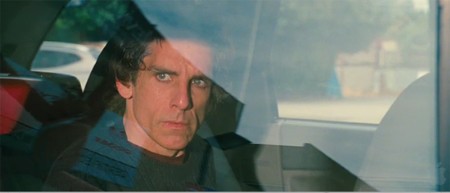Film Review: ‘Greenberg’ and the Half-Cooked
Despite some poignant moments, “Greenberg” ends up as a half-cooked film about half-cooked people.

Greenberg (Ben Stiller) looks for the inner man in Noah Baumbach
Reviewed By Justin Marble
In perhaps the most revealing scene in Noah Baumbach’s latest film, “Greenberg,” Ben Stiller’s title character stands in the middle of a party, alone, as the director’s camera slowly moves in on him from above. The partygoers are a mixture of Roger Greenberg’s friends and their children, but Greenberg, 40 and unmarried, exists uneasily somewhere in-between. Far too old for kids’ games but clutching immaturity, he sabotages nearly all of his meaningful relationships and seems content to, in his own words, “do nothing right now.”
That’s what” “Greenberg” is about: the strange limbo between being physically old and emotionally young.
In his youth, Greenberg was in a band that actually had a shot at a record deal. Full of rebelliousness against the evils of the music industry, Greenberg turned the deal down, only to have the band break up and the members scatter. Fifteen years later, Greenberg channels his rebellious anger into his one hobby: writing snarky letters to “evil” corporations (Starbucks, American Airlines, etc.).
Greenberg makes a living as a carpenter, building things by day and breaking down all of his meaningful relationships at night. Cynical, bitter, selfish, and neurotic, Greenberg is acidic and bitingly sarcastic to anybody who gets close to him, yet he is so desperate and lonely that this does not stop him from constantly seeking out companions.
While living in New York before the events of the film, Greenberg has a mental breakdown that ends with him in an insane asylum. After checking out, Greenberg moves to Los Angeles, ostensibly to build a doghouse for his more-successful brother while he takes his family on vacation. While there, he strikes up a relationship with his brother’s 20-something assistant Florence (Greta Gerwig) and attempts to reconnect with his old band mate, Ivan (Rhys Ifans), who is going through a divorce.
And that brings us back to the party. When Greenberg first sees the crowd gathering, he urges Ivan to keep driving (Greenberg never drives but is happy to provide assistance from the passenger seat). Ivan forces Greenberg to go in for a drink, and Greenberg is dismayed at the amount of kids at the party. The house is that of the third member of the band, Beller (Mark Duplass), who, although rich, still resents Greenberg for killing their shot at rock stardom.
And here, as in other poignant moments in Baumbach’s film, we see Greenberg for who he truly is: a man who acts like he has everything wired yet can’t seem to connect to anything around him. He is admonished by Beller for his past transactions, awkwardly hits on his recently-divorced ex-girlfriend, and is emasculated every time the question of why he’s in Los Angeles comes up.
However, these moments of insight are too few and far between. “Greenberg,” like its title character, ends up in limbo as well. By casting mumblecore icons Gerwig and Duplass and even referencing Andrew Bujalski’s “Funny Ha Ha” at one point, it’s clear that Baumbach wants to reach the level of honesty and realism that forms the backbone of the mumblecore movement.
But Baumbach is a writer first, and while his literary dialogue works in the heavily fictionalized and imagined worlds of Wes Anderson (whom Baumbach has collaborated with numerous times), it clashes awkwardly with Baumbach’s vision of modern Los Angeles. Greenberg hides behind his sarcasm and wit avoiding anything that could potentially hurt him, but Baumbach is guilty of the same thing in that his dialogue proves to be a stumbling block to any sense of immersion or truth. He is unable to rein in his writerly instincts at points, and it ends up hurting the film.

Greenberg (Ben Stiller) on the prowl for companionship.
Stiller and Baumbach’s emotionally-stunted man-child has also been played out. Baumbach’s more fully realized debut film, 1995’s “Kicking and Screaming,” dealt with a group of fresh, young college graduates with personalities much the same as Greenberg’s, to the point that Greenberg could have been any of them simply aged 15 years.
A film like Anderson’s “The Royal Tenenbaums” better illustrates a similar idea because it provides a reason why the characters have become this way, a reason which the audience never gets in “Greenberg.”
And as far as acidic drifters go, give me David Thewlis in Mike Leigh’s “Naked” over Stiller here any day. Opposite Greenberg, Gerwig plays Florence with her usual grace, but the character comes off as more of a rough sketch than a fully developed character. Baumbach can certainly write the neurotic Woody Allen male role (because he is that role himself), but he has trouble with female characters. Watching Greenberg and Florence attempt to grab on to each other is the core of the film, but it never truly resonates.
Greenberg’s rekindled friendship with his old band mate Ivan, however, nearly saves the film. Ifans gets a chance to tone down his usual off-the-wall comedic nature and shows off some truly impressive acting chops. Ivan has every reason to resent Greenberg because while Beller ends up doing well post-band breakup, Ivan scrapes together a meager existence fixing computers. Yet he needs a friend as much as Greenberg does. At one point, Ivan picks up the phone in his motel room late at night. He is watching a Lindsay Lohan movie by himself, which makes him come off as even more vulnerable than the recent mental patient Greenberg.
The tagline of the film is “he has a lot on his mind.” While true of both Baumbach and Greenberg, they each have trouble saying it. “Greenberg” ends up as a half-cooked film about half-cooked people. But if Greenberg displays little movement or progress, it may be because Baumbach cannot progress himself. Fifteen years later, he’s still kicking and screaming.
